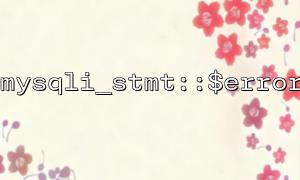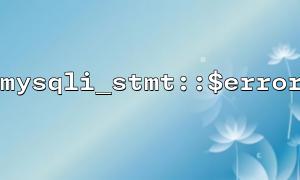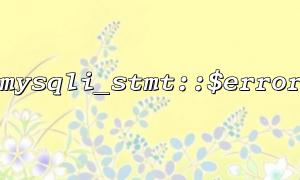When using the MySQLi extension of PHP, mysqli_stmt::$error and mysqli_stmt::bind_param() are two very useful functions that can help developers efficiently diagnose errors and solve problems in SQL queries, especially when encountering type errors when parameter binding. This article will explore how to use these two functions to diagnose and resolve type binding errors and provide a concrete example.
The mysqli_stmt::bind_param() function is used to bind variables to parameter locations in SQL statements. The common syntax for this function is as follows:
bool mysqli_stmt::bind_param ( string $types , mixed &$var , mixed &$... )
$types is a string containing the corresponding parameter types in SQL query. For example, i represents an integer, d represents a double-precision floating point number, s represents a string, b represents a BLOB data, etc.
The following parameters are variables that need to be bound to SQL query, and correspond to the type characters in $types in order.
When bind_param() binds parameters, if the type does not match or another error occurs, mysqli_stmt::$error will contain the details of the error. This can help us quickly locate the problem and fix it. Usually, the error message will be returned when SQL is executed, and the developer can check whether an error occurs by checking $stmt->error .
We can check $stmt->error to get the error message after calling bind_param() and executing SQL statements. Here is a sample code:
<?php
$mysqli = new mysqli("localhost", "username", "password", "database");
if ($mysqli->connect_error) {
die("Connection failed: " . $mysqli->connect_error);
}
$stmt = $mysqli->prepare("INSERT INTO users (name, age) VALUES (?, ?)");
if (!$stmt) {
die("Statement preparation failed: " . $mysqli->error);
}
$name = "John Doe";
$age = "twenty"; // Error here:age It should be an integer,But we passed in the string
// use bind_param Bind parameters
$stmt->bind_param("si", $name, $age);
if (!$stmt->execute()) {
echo "Error executing query: " . $stmt->error; // Output error message
} else {
echo "Record inserted successfully!";
}
$stmt->close();
$mysqli->close();
?>
In the above code, we deliberately set $age to the string "twenty", rather than an integer. When binding, bind_param() checks whether the type matches, because we specify "si" when binding ( s means string and i means integer). Due to type mismatch, mysqli_stmt::$error will return specific error information.
Common type binding errors include:
Integer and string binding error : For example, string is bound at the i type (integral) position.
String and number binding error : For example, a non-string type (such as an array or object) is bound to the s type (string).
Missing parameter binding : The number of bound variables does not match the number of parameters in the SQL query.
The solution to these problems is usually simple. make sure:
When bind_param() is called, the order and type of parameters strictly match the placeholders in the SQL statement.
Use the correct data type. For example, type i should bind integers, type s should bind strings.
You can also use debugging tools such as var_dump() to check the bound variable types before executing SQL queries to ensure that there is no problem of type mismatch.
mysqli_stmt::$error and mysqli_stmt::bind_param() are very powerful debugging tools that can help developers diagnose and resolve type binding errors in SQL queries more easily. In actual development, the rational use of these two functions can greatly improve the efficiency of error detection and reduce potential bugs. By ensuring that parameter types match, common binding errors can be effectively avoided and SQL queries are executed normally.
Related Tags:
mysqli_stmt














